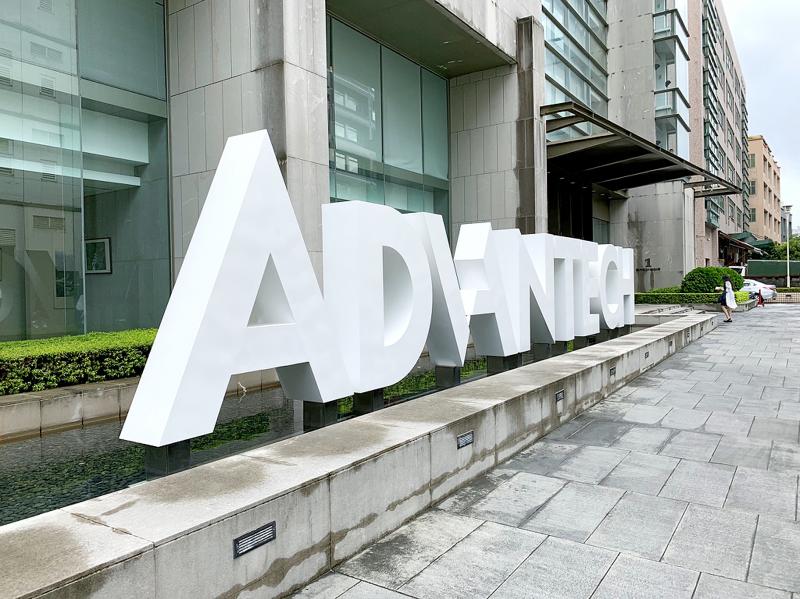Leading industrial PC maker Advantech Co Ltd (研華) yesterday gave an optimistic outlook for shipments this quarter, citing recovering market demand as countries around the world gradually move to ease restrictions to contain the COVID-19 pandemic.
“We are seeing quite a significant rebound [in demand] on a sequential basis this quarter, especially in China,” Advantech spokesperson Jill Su (蘇智蘋) told an investors’ conference, citing healthy orders across the board for its embedded Internet of Things (IoT) business segment.
Demand from North America is expected to improve further this quarter, thanks to various applications within the healthcare and logistics sectors, bolstering shipments for Advantech’s industrial IoT and cloud IoT business segments, Su said.

Photo: CNA
“We are having some delays [in shipments] due to the pandemic ... but it [the pandemic] has boosted demand from industries across the board,” Su said, adding that firms are driven to move workloads online as employees work from home.
However, the company’s operations in Europe, which are centered around its service IoT segment, are likely to suffer setbacks as a majority of countries in the region have yet to lift the heavy restrictions imposed to combat the spread of COVID-19, Su said.
China and the US contributed 29 percent each to Advantech’s total sales last year, while Europe generated another 17 percent, company data showed.
Overall sales this quarter are estimated to be between US$450 million and US$470 million, representing an increase of between 19.6 percent and 24.9 percent compared with sales of NT$11.27 billion (US$376.8 million) last quarter, the company said.
Gross margin is expected to be flat at 39 percent or dip slightly to 37 percent, it said.
Operating margin, on the other hand, is forecast to increase from 14.7 percent last quarter to between 16.5 percent and 18.5 percent this quarter on improved operational efficiency, it added.
“Online sales contributed to 10 percent of total sales last quarter as some of our regional offices remained closed,” Su said, pointing to the US, Europe, Japan and India.
The company’s production has, for the most part, resumed to normal levels, Su said, adding that supply shortages of casings, power supplies, cables and connectors are expected to be resolved by the end of the month.
Advantech posted a 24 percent quarter-on-quarter decline and 20 percent year-on-year fall in net profit to NT$1.29 billion for last quarter, leading to earnings per share of NT$1.85, down from NT$2.43 in the previous quarter and NT$2.31 a year earlier.

NEW IDENTITY: Known for its software, India has expanded into hardware, with its semiconductor industry growing from US$38bn in 2023 to US$45bn to US$50bn India on Saturday inaugurated its first semiconductor assembly and test facility, a milestone in the government’s push to reduce dependence on foreign chipmakers and stake a claim in a sector dominated by China. Indian Prime Minister Narendra Modi opened US firm Micron Technology Inc’s semiconductor assembly, test and packaging unit in his home state of Gujarat, hailing the “dawn of a new era” for India’s technology ambitions. “When young Indians look back in the future, they will see this decade as the turning point in our tech future,” Modi told the event, which was broadcast on his YouTube channel. The plant would convert

‘SEISMIC SHIFT’: The researcher forecast there would be about 1.1 billion mobile shipments this year, down from 1.26 billion the prior year and erasing years of gains The global smartphone market is expected to contract 12.9 percent this year due to the unprecedented memorychip shortage, marking “a crisis like no other,” researcher International Data Corp (IDC) said. The new forecast, a dramatic revision down from earlier estimates, gives the latest accounting of the ongoing memory crunch that is affecting every corner of the electronics industry. The demand for advanced memory to power artificial intelligence (AI) tasks has drained global supply until well into next year and jeopardizes the business model of many smartphone makers. IDC forecast about 1.1 billion mobile shipments this year, down from 1.26 billion the prior

People stand in a Pokemon store in Tokyo on Thursday. One of the world highest-grossing franchises is celebrated its 30th anniversary yesterday.

Zimbabwe’s ban on raw lithium exports is forcing Chinese miners to rethink their strategy, speeding up plans to process the metal locally instead of shipping it to China’s vast rechargeable battery industry. The country is Africa’s largest lithium producer and has one of the world’s largest reserves, according to the US Geological Survey (USGS). Zimbabwe already banned the export of lithium ore in 2022 and last year announced it would halt exports of lithium concentrates from January next year. However, on Wednesday it imposed the ban with immediate effect, leaving unclear what the lithium mining sector would do in the